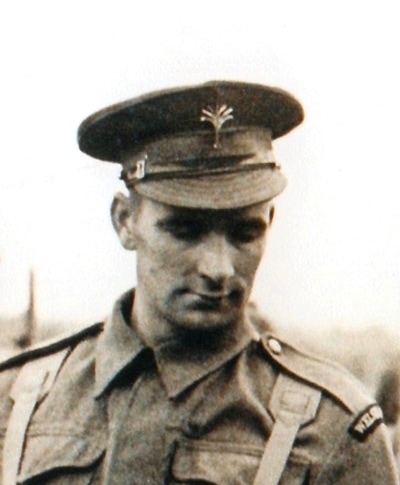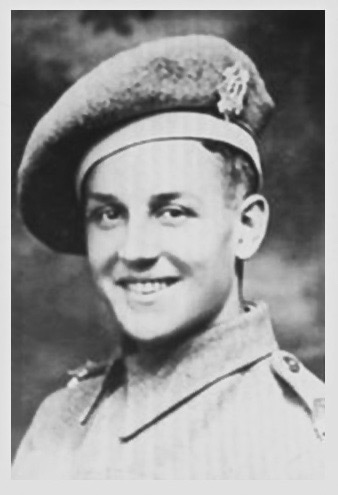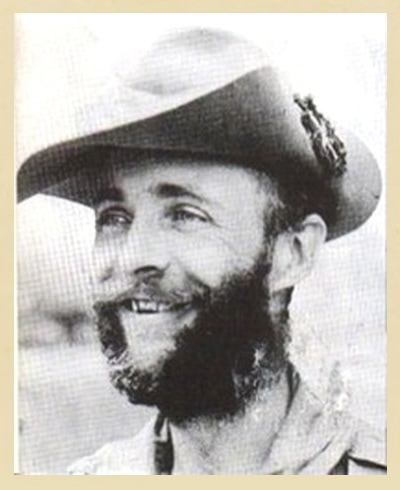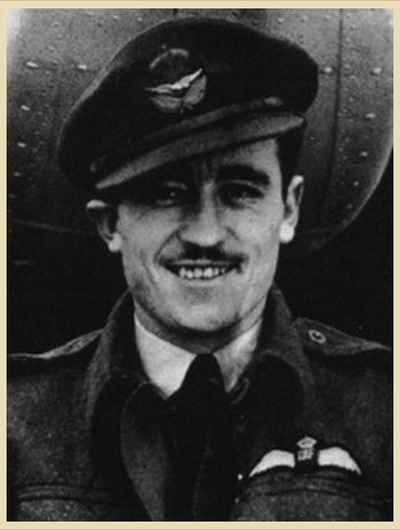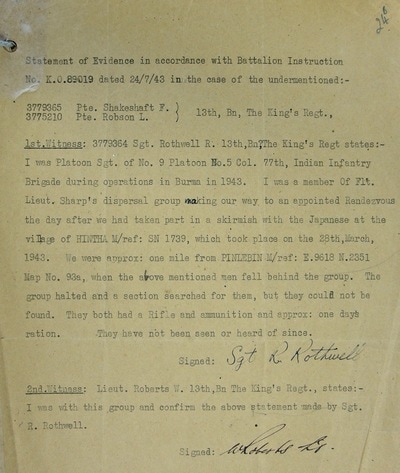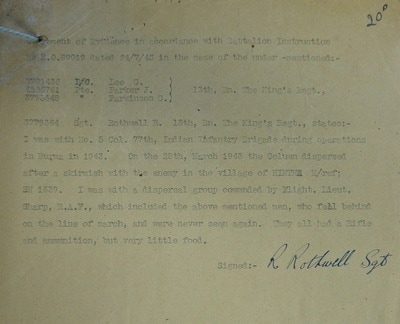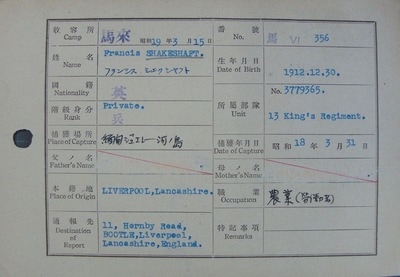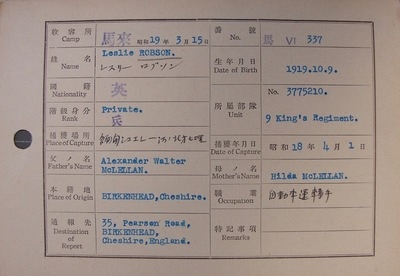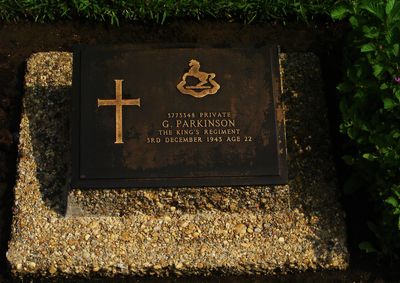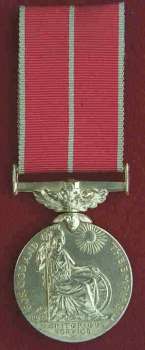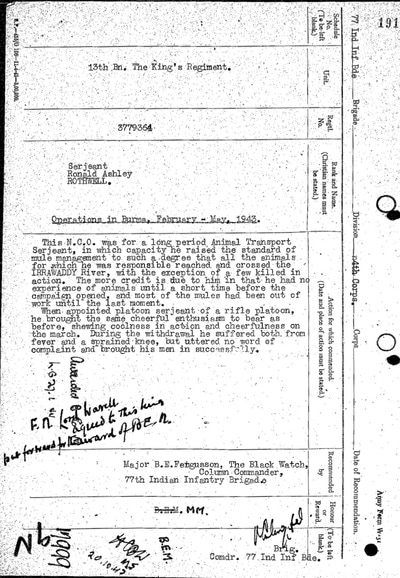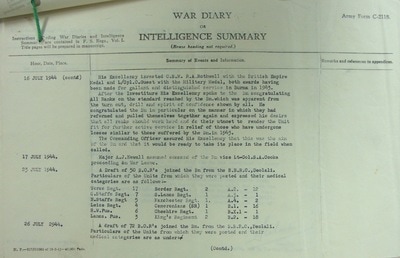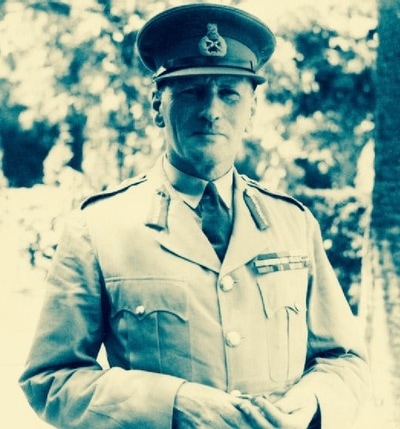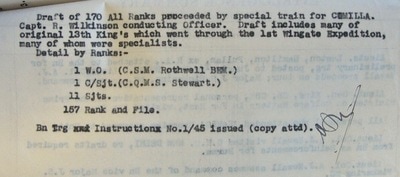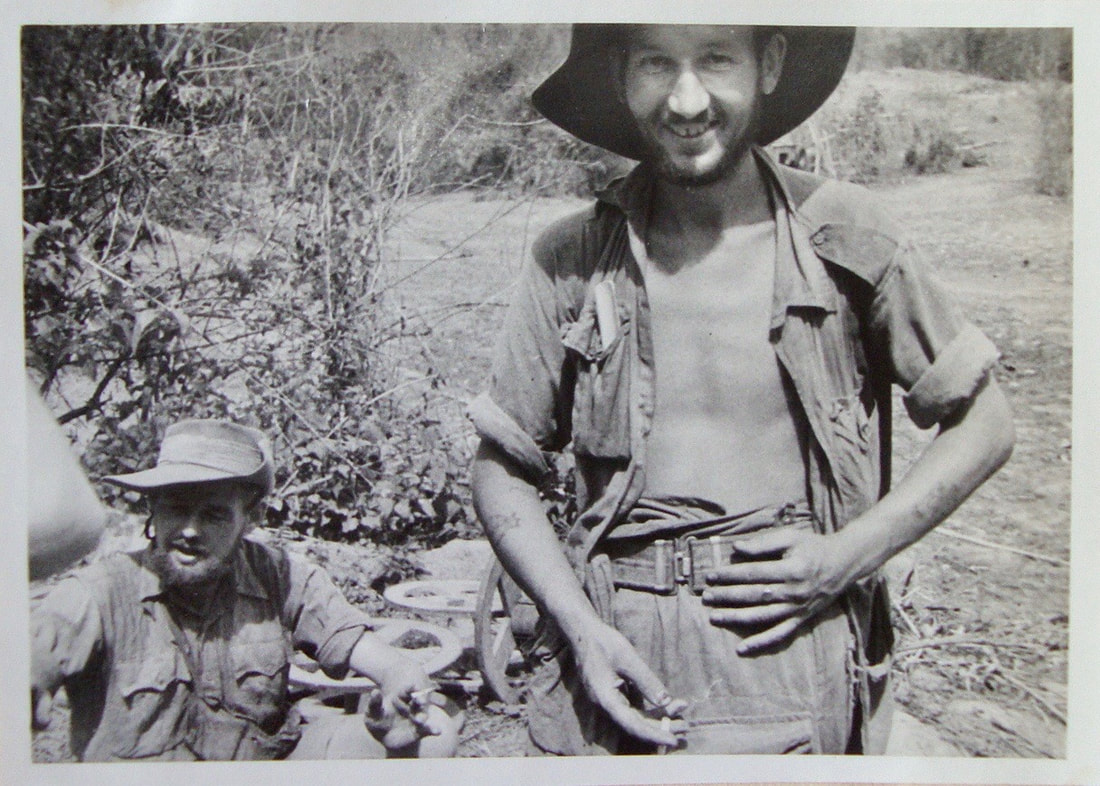Sgt. Ronald Ashley Rothwell
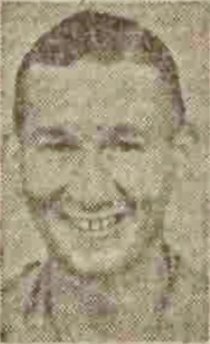 Sgt. Ronald Rothwell.
Sgt. Ronald Rothwell.
Ronald Ashley Rothwell was born in Liverpool on the 14th October 1912 and was educated at St Anne's Church of England School in the Stanley area of the city. Ronald worked for the Liverpool Corporation in the Passenger Transport Department and lived before the war in Bibby Street, Old Swan. Sgt. Rothwell enlisted into the British Army, joining the 13th Battalion of the King's (Liverpool) Regiment at their first formal barracks at Jordan Hill College in Glasgow.
By the time the 13th King's were posted overseas to India in December 1941, Rothwell had been promoted to the rank of Sergeant. Working within A 'Company of the battalion, he became a popular NCO with both officers and men alike. The King's settled down at Secunderabad, where they performed various garrison and policing duties in the locality. As history now knows, in mid-July 1942, the battalion were chosen to form the British infantry element of the newly raised 77th Indian Infantry Brigade under the command of Brigadier Orde Charles Wingate.
Ronald Rothwell began his time with the Chindits as a Rifle Platoon Section leader under Lt. George Borrow, but was soon transferred to work as the Animal Transport Sergeant within 5 Column, firstly under the leadership of Captain Ted Waugh of the King's, but later commanded by Major Bernard Fergusson of the Black Watch. Sgt. Rothwell proved an invaluable addition to the column with his skills in handling the mules and horses soon becoming apparent to the officers in charge, Lts. W. Smyly and W. Roberts.
Once inside Burma, having crossed the Chindwin River on the 16th February 1943, Ronald took his place in the vanguard of the column. Bernard Fergusson, in his book, Beyond the Chindwin describes those first few days behind enemy lines:
Up at the head of the column marched Duncan Menzies and I and John Fraser; behind us came Cairns, the ideal Serjeant-Major, in temperament as much as efficiency; then came Peter Dorans; Rothwell the Animal Transport Serjeant; L./Cpl. Lee the clerk; Horton the cipher operator, known throughout the column as Jimmy 'Orton; Foster and White, the two Signallers; Serjeant Skillander an Irish ex-jockey and spare Serjeant in Column Headquarters; and finally Brookes the bugler. They were a witty and cheerful lot, and John, Duncan and I were often in fits of laughter at what we overheard from just behind us. Rothwell, a calm, efficient man, with an excellent sense of humour, led all the singing; his two favourites, sung every night, and often two or three times a night were: I’ve got a Sixpence, Jolly, Jolly Sixpence, and When Johnny Comes Marching Home Again.
Not long into the expedition, Lt. William Roberts, known to all in 5 Column as Gerry, was asked to revoke his role in Animal Transport and head up one of the Rifle Platoons. On the 3rd March, he asked Major Fergusson if he might take Sgt. Rothwell as his second in this platoon and this request was granted. From this moment on, the fate of these two soldiers would be intrinsically linked. Gerry Roberts' unit often worked ahead of the main body of the column, scouting out new tracks and trails, and testing the trustworthiness of the villages encountered along the way. They were heavily involved in 5 Column's first skirmish with the Japanese at the hamlet of Kyaik-in, close to where Fergusson's men were to deliver their demolition of the Myitkhina-Mandalay railway at Bonchaung.
To read more about this engagement with the enemy and the subsequent involvement of Lt. Roberts' platoon, please click on the following link: Lieutenant John Kerr and the Fighting Men of Kyaik-in
After the successful demolitions at the railway, 5 Column moved directly east towards the Irrawaddy River. On the 10th March they crossed over, but not before replenishing their depleted rations at the village of Tigyaing. Lt. Gerry Roberts recalled this moment in the pages of his own personnel diary:
10th March 1943: Am holding a position on a crest in the area of the temple at Tigyaing on the Irrawaddy. The people are so grateful to see us. Had the most wonderful meal of rice cooked by the villagers; sent a boy to buy bananas and Sgt. Rothwell to buy sugar. Sliced half dozen bananas on a plate of rice and covered it with sugar, a wonderful treat. Looking through my field glasses, I can’t see any movement on this side of the river. We shall cross as soon as possible.
The crossing was good on the whole, but I felt most uncomfortable in the little boat I was in. I am sent down stream with a part of my group to blow up a River Steamer. We had a hot reception on landing at the East Bank. Japs opened up with 4inch mortars and machine guns from their position on the beach. Got over this ok and marched on about four miles to where Captain MacDonald had recce’d a bivouac area.
Wingate's decision to take the majority of his Brigade over the Irrawaddy River proved with the benefit of hindsight to be a mistake. During the third week of March and with dispersal in mind, 5 Column were given orders to create a diversion for the rest of the Brigade, which now found itself trapped in a three-sided bag between the Irrawaddy and Shweli Rivers to the west and north and the Mongmit-Myitson motor road to the south. Wingate instructed Fergusson to "trail his coat" and lead the Japanese pursuers away from the general direction of the Irrawaddy and in particular the area around the town of Inywa, where Wingate now hoped to re-cross the river.
By March 28th, 5 Column had reached the village of Hintha which was situated in an area of thick and tight-set bamboo scrub. Any attempt to navigate around the settlement proved impossible, and so rather reluctantly Fergusson decided to enter the village by the main track and check for the presence of enemy patrols. He unluckily stumbled upon such a patrol and a fire-fight ensued. The battle at Hintha proved to be 5 Column's Waterloo and many men were killed or wounded during the engagement at the village. To read more about Hintha and the men who perished there, please click on the following link: Pte. John Henry Cobb
After a battle lasting several hours, Major Fergusson withdrew his men from Hintha and led them away towards a pre-arranged rendezvous point some two miles or so to the northeast. Here he met up with the rest of his unit, who under the command of Flight-Lieutenant Denny Sharp, the column's RAF Liaison officer, were waiting for their commander's return in a dried up river bed or chaung. Disastrously, as the reacquainted column marched away from the chaung it was once again attacked, this time by a large Japanese patrol which had been tracking Fergusson's men since their withdrawal from Hintha. Over one hundred men were cut adrift from 5 Column at this juncture. In one witness statement provided by a survivor of Operation Longcloth, Sgt. Rothwell was rumoured to be amongst those lost at the ambush. However, further mentions in both Bernard Fergusson's book and the diary of Gerry Roberts, prove this rumour to be untrue.
Seen below are some of the men mentioned in this narrative so far, please click on any image to bring it forward on the page.
By the time the 13th King's were posted overseas to India in December 1941, Rothwell had been promoted to the rank of Sergeant. Working within A 'Company of the battalion, he became a popular NCO with both officers and men alike. The King's settled down at Secunderabad, where they performed various garrison and policing duties in the locality. As history now knows, in mid-July 1942, the battalion were chosen to form the British infantry element of the newly raised 77th Indian Infantry Brigade under the command of Brigadier Orde Charles Wingate.
Ronald Rothwell began his time with the Chindits as a Rifle Platoon Section leader under Lt. George Borrow, but was soon transferred to work as the Animal Transport Sergeant within 5 Column, firstly under the leadership of Captain Ted Waugh of the King's, but later commanded by Major Bernard Fergusson of the Black Watch. Sgt. Rothwell proved an invaluable addition to the column with his skills in handling the mules and horses soon becoming apparent to the officers in charge, Lts. W. Smyly and W. Roberts.
Once inside Burma, having crossed the Chindwin River on the 16th February 1943, Ronald took his place in the vanguard of the column. Bernard Fergusson, in his book, Beyond the Chindwin describes those first few days behind enemy lines:
Up at the head of the column marched Duncan Menzies and I and John Fraser; behind us came Cairns, the ideal Serjeant-Major, in temperament as much as efficiency; then came Peter Dorans; Rothwell the Animal Transport Serjeant; L./Cpl. Lee the clerk; Horton the cipher operator, known throughout the column as Jimmy 'Orton; Foster and White, the two Signallers; Serjeant Skillander an Irish ex-jockey and spare Serjeant in Column Headquarters; and finally Brookes the bugler. They were a witty and cheerful lot, and John, Duncan and I were often in fits of laughter at what we overheard from just behind us. Rothwell, a calm, efficient man, with an excellent sense of humour, led all the singing; his two favourites, sung every night, and often two or three times a night were: I’ve got a Sixpence, Jolly, Jolly Sixpence, and When Johnny Comes Marching Home Again.
Not long into the expedition, Lt. William Roberts, known to all in 5 Column as Gerry, was asked to revoke his role in Animal Transport and head up one of the Rifle Platoons. On the 3rd March, he asked Major Fergusson if he might take Sgt. Rothwell as his second in this platoon and this request was granted. From this moment on, the fate of these two soldiers would be intrinsically linked. Gerry Roberts' unit often worked ahead of the main body of the column, scouting out new tracks and trails, and testing the trustworthiness of the villages encountered along the way. They were heavily involved in 5 Column's first skirmish with the Japanese at the hamlet of Kyaik-in, close to where Fergusson's men were to deliver their demolition of the Myitkhina-Mandalay railway at Bonchaung.
To read more about this engagement with the enemy and the subsequent involvement of Lt. Roberts' platoon, please click on the following link: Lieutenant John Kerr and the Fighting Men of Kyaik-in
After the successful demolitions at the railway, 5 Column moved directly east towards the Irrawaddy River. On the 10th March they crossed over, but not before replenishing their depleted rations at the village of Tigyaing. Lt. Gerry Roberts recalled this moment in the pages of his own personnel diary:
10th March 1943: Am holding a position on a crest in the area of the temple at Tigyaing on the Irrawaddy. The people are so grateful to see us. Had the most wonderful meal of rice cooked by the villagers; sent a boy to buy bananas and Sgt. Rothwell to buy sugar. Sliced half dozen bananas on a plate of rice and covered it with sugar, a wonderful treat. Looking through my field glasses, I can’t see any movement on this side of the river. We shall cross as soon as possible.
The crossing was good on the whole, but I felt most uncomfortable in the little boat I was in. I am sent down stream with a part of my group to blow up a River Steamer. We had a hot reception on landing at the East Bank. Japs opened up with 4inch mortars and machine guns from their position on the beach. Got over this ok and marched on about four miles to where Captain MacDonald had recce’d a bivouac area.
Wingate's decision to take the majority of his Brigade over the Irrawaddy River proved with the benefit of hindsight to be a mistake. During the third week of March and with dispersal in mind, 5 Column were given orders to create a diversion for the rest of the Brigade, which now found itself trapped in a three-sided bag between the Irrawaddy and Shweli Rivers to the west and north and the Mongmit-Myitson motor road to the south. Wingate instructed Fergusson to "trail his coat" and lead the Japanese pursuers away from the general direction of the Irrawaddy and in particular the area around the town of Inywa, where Wingate now hoped to re-cross the river.
By March 28th, 5 Column had reached the village of Hintha which was situated in an area of thick and tight-set bamboo scrub. Any attempt to navigate around the settlement proved impossible, and so rather reluctantly Fergusson decided to enter the village by the main track and check for the presence of enemy patrols. He unluckily stumbled upon such a patrol and a fire-fight ensued. The battle at Hintha proved to be 5 Column's Waterloo and many men were killed or wounded during the engagement at the village. To read more about Hintha and the men who perished there, please click on the following link: Pte. John Henry Cobb
After a battle lasting several hours, Major Fergusson withdrew his men from Hintha and led them away towards a pre-arranged rendezvous point some two miles or so to the northeast. Here he met up with the rest of his unit, who under the command of Flight-Lieutenant Denny Sharp, the column's RAF Liaison officer, were waiting for their commander's return in a dried up river bed or chaung. Disastrously, as the reacquainted column marched away from the chaung it was once again attacked, this time by a large Japanese patrol which had been tracking Fergusson's men since their withdrawal from Hintha. Over one hundred men were cut adrift from 5 Column at this juncture. In one witness statement provided by a survivor of Operation Longcloth, Sgt. Rothwell was rumoured to be amongst those lost at the ambush. However, further mentions in both Bernard Fergusson's book and the diary of Gerry Roberts, prove this rumour to be untrue.
Seen below are some of the men mentioned in this narrative so far, please click on any image to bring it forward on the page.
After another ten days of constant marching, in addition to a difficult and treacherous crossing of the Shweli River, the remnants of 5 Column reached the banks of the Irrawaddy once more. Major Fergusson divided his column into three dispersal parties of around 25 men in each, taking command of one group himself and appointing Denny Sharp and Gerry Roberts to lead another, with the last party under the guidance of Captain Tommy Roberts. On the 10th April 1943, Denny Sharp, Gerry Roberts and Sgt. Rothwell, along with the rest of their party succeeded in getting over the river. It would take these Chindits another two weeks to make the journey back to India, often going without food or water for days on end and having to risk entering unfriendly villages in the hope of supplementing their meagre rations.
On the 17th April, Major Fergusson and Denny Sharp's parties met up by chance at the village of Pakaw. Fergusson remembered:
We had a great reunion with them and all ranks mingled to swap adventures. They had a clean run across the railway, although like us they had nearly run into a Japanese patrol about two stations down the line from Kadu. Otherwise, they had no scares and Denny, splendid fellow that he was, had the whole business under control. I talked to his men and found them cheerful enough. Serjeant Rothwell was in the middle of a bad go of malaria, but characteristically made light of it. There was a general wish to merge both parties at this point, but both from the point of view of foraging and from confusing the issue of any troops trying to intercept us, I preferred to remain separate.
Denny Sharp's dispersal party re-crossed the Chindwin on the 24th April after bumping into a patrol of Seaforth Highlanders on the east bank. The Scots took them under their wing, feeding them bully beef and handing out cigarettes, before sending them on to Thanan for a wash, shave and much needed change of clothing. Most returning Chindits spent at least a few days at the 19th Casualty Clearing Station near Imphal, where Matron Agnes McGearey took care of their pains. After a period of rest and recuperation all men were sent back to their various regiments. Sgt. Rothwell rejoined the 13th King's, who were now stationed at the Napier Barracks in Karachi.
Ronald Rothwell provided a series of witness statements in regards the fate or last known whereabouts of several of his Chindit comrades. On the 24th July 1943, he gave the following statements to the Army Investigation Bureau, who were searching for information about the missing and lost from Operation Longcloth:
Statement of evidence in accordance with Battalion instruction, in the case of the undermentioned:
3779365 Pte. F. Shakeshaft
3775210 Pte. L. Robson
1st Witness: 3779364 Sgt. R. Rothwell, 13th King's Regiment states:
I was Platoon Sgt. of No. 9 Platoon, 5 Column, 77th Indian Infantry Brigade during operations in Burma in 1943. I was a member of Flight Lieutenant Sharp's dispersal group, making our way to an appointed rendezvous the day after we had taken part in a skirmish with the Japanese at the village of Hintha, (map ref. SN 1739), which took place on the 28th March 1943. We were approximately one mile from Pinlebin (map ref. E 9618 N 2351), when the above mentioned men fell behind the group. The group halted and a section searched for them, but they could not be found. They both had rifles and ammunition and one days rations. They have not been seen or heard of since.
In the case of the undermentioned men:
3791436 Cpl. G. Lee
4206761 Pte. J. Parker
3773348 Pte. G. Parkinson
Sgt. R. Rothwell states:
I was with No. 5 Column, 77th Indian Infantry Brigade during operations in Burma in 1943. On the 28th March, the Column dispersed after a skirmish with the enemy in the village of Hintha. I was with a dispersal group commanded by Flight Lieutenent Sharp of the RAF, which included the above mentioned men, who fell behind the line of march and were never seen again. They all had rifles and ammunition, but very little food.
Signed-
On the 17th April, Major Fergusson and Denny Sharp's parties met up by chance at the village of Pakaw. Fergusson remembered:
We had a great reunion with them and all ranks mingled to swap adventures. They had a clean run across the railway, although like us they had nearly run into a Japanese patrol about two stations down the line from Kadu. Otherwise, they had no scares and Denny, splendid fellow that he was, had the whole business under control. I talked to his men and found them cheerful enough. Serjeant Rothwell was in the middle of a bad go of malaria, but characteristically made light of it. There was a general wish to merge both parties at this point, but both from the point of view of foraging and from confusing the issue of any troops trying to intercept us, I preferred to remain separate.
Denny Sharp's dispersal party re-crossed the Chindwin on the 24th April after bumping into a patrol of Seaforth Highlanders on the east bank. The Scots took them under their wing, feeding them bully beef and handing out cigarettes, before sending them on to Thanan for a wash, shave and much needed change of clothing. Most returning Chindits spent at least a few days at the 19th Casualty Clearing Station near Imphal, where Matron Agnes McGearey took care of their pains. After a period of rest and recuperation all men were sent back to their various regiments. Sgt. Rothwell rejoined the 13th King's, who were now stationed at the Napier Barracks in Karachi.
Ronald Rothwell provided a series of witness statements in regards the fate or last known whereabouts of several of his Chindit comrades. On the 24th July 1943, he gave the following statements to the Army Investigation Bureau, who were searching for information about the missing and lost from Operation Longcloth:
Statement of evidence in accordance with Battalion instruction, in the case of the undermentioned:
3779365 Pte. F. Shakeshaft
3775210 Pte. L. Robson
1st Witness: 3779364 Sgt. R. Rothwell, 13th King's Regiment states:
I was Platoon Sgt. of No. 9 Platoon, 5 Column, 77th Indian Infantry Brigade during operations in Burma in 1943. I was a member of Flight Lieutenant Sharp's dispersal group, making our way to an appointed rendezvous the day after we had taken part in a skirmish with the Japanese at the village of Hintha, (map ref. SN 1739), which took place on the 28th March 1943. We were approximately one mile from Pinlebin (map ref. E 9618 N 2351), when the above mentioned men fell behind the group. The group halted and a section searched for them, but they could not be found. They both had rifles and ammunition and one days rations. They have not been seen or heard of since.
In the case of the undermentioned men:
3791436 Cpl. G. Lee
4206761 Pte. J. Parker
3773348 Pte. G. Parkinson
Sgt. R. Rothwell states:
I was with No. 5 Column, 77th Indian Infantry Brigade during operations in Burma in 1943. On the 28th March, the Column dispersed after a skirmish with the enemy in the village of Hintha. I was with a dispersal group commanded by Flight Lieutenent Sharp of the RAF, which included the above mentioned men, who fell behind the line of march and were never seen again. They all had rifles and ammunition, but very little food.
Signed-
For the record, this is what actually happened to the above mentioned Kingsmen:
3779365 Pte. Francis Shakeshaft from Bootle in Liverpool, was captured on the 31st March 1943. He was given the POW number 356 and survived just over two years as a prisoner of war in Rangoon Jail, before being liberated in April 1945 near the Burmese town of Pegu.
3775210 Pte. Leslie Robson, formerly with the 9th Battalion of the King's Regiment and from Birkenhead in Cheshire, was captured by the Japanese on the 1st April 1943. He was given the POW number 337 and much like Francis Shakeshaft was liberated by Allied forces in late April 1945 at Pegu.
3781436 Lance Corporal George Lee from Manchester, was 5 Column's Cypher Clerk on Operation Longcloth. This soldier went missing from his unit after he tried to reclaim some cyphers, lost when a mule fell into a ravine. L/Cpl. Lee was also taken prisoner in 1943, but sadly perished inside Block 6 of Rangoon Jail on the 2nd September that same year. His POW number was 576 and he was buried at the English Cantonment Cemetery situated close to the Royal Lakes in the eastern sector of the city.
To read more about L/Cpl. Lee, please click on the following link: Lance Corporal George Lee
4206791 Pte. Jack Parker formerly of the Royal Welch Fusiliers and from Cotteridge in Birmingham, died in Block 6 of Rangoon Jail on the 22nd February 1944. Jack had the POW number 506 whilst a prisoner of war and was buried in grave no. 158 at the English Cantonment Cemetery.
3773348 Pte. George Parkinson from Liverpool, perished inside Block 6 of Rangoon Jail on the 3rd December 1943 and was buried at the English Cantonment Cemetery in grave no. 99. His POW number whilst held in Japanese hands was 520. All burials at the Cantonment Cemetery were moved over to the newly constructed Rangoon War Cemetery in early 1946.
Shown in the Gallery below are Sgt. Rothwell's two witness statements, the POW index cards for Francis Shakeshaft and Leslie Robson and a photograph of Pte. George Parkinson and his grave at Rangoon War Cemetery. Please click on any image to bring it forward on the page.
3779365 Pte. Francis Shakeshaft from Bootle in Liverpool, was captured on the 31st March 1943. He was given the POW number 356 and survived just over two years as a prisoner of war in Rangoon Jail, before being liberated in April 1945 near the Burmese town of Pegu.
3775210 Pte. Leslie Robson, formerly with the 9th Battalion of the King's Regiment and from Birkenhead in Cheshire, was captured by the Japanese on the 1st April 1943. He was given the POW number 337 and much like Francis Shakeshaft was liberated by Allied forces in late April 1945 at Pegu.
3781436 Lance Corporal George Lee from Manchester, was 5 Column's Cypher Clerk on Operation Longcloth. This soldier went missing from his unit after he tried to reclaim some cyphers, lost when a mule fell into a ravine. L/Cpl. Lee was also taken prisoner in 1943, but sadly perished inside Block 6 of Rangoon Jail on the 2nd September that same year. His POW number was 576 and he was buried at the English Cantonment Cemetery situated close to the Royal Lakes in the eastern sector of the city.
To read more about L/Cpl. Lee, please click on the following link: Lance Corporal George Lee
4206791 Pte. Jack Parker formerly of the Royal Welch Fusiliers and from Cotteridge in Birmingham, died in Block 6 of Rangoon Jail on the 22nd February 1944. Jack had the POW number 506 whilst a prisoner of war and was buried in grave no. 158 at the English Cantonment Cemetery.
3773348 Pte. George Parkinson from Liverpool, perished inside Block 6 of Rangoon Jail on the 3rd December 1943 and was buried at the English Cantonment Cemetery in grave no. 99. His POW number whilst held in Japanese hands was 520. All burials at the Cantonment Cemetery were moved over to the newly constructed Rangoon War Cemetery in early 1946.
Shown in the Gallery below are Sgt. Rothwell's two witness statements, the POW index cards for Francis Shakeshaft and Leslie Robson and a photograph of Pte. George Parkinson and his grave at Rangoon War Cemetery. Please click on any image to bring it forward on the page.
For his efforts during the first Wingate expedition, Sgt. Ronald Ashley Rothwell was awarded the British Empire Medal. This award was recommended by Major Bernard Fergusson via Field Marshall (Viceroy) Wavell and approved by the King on the 2nd February 1944, after the normal publication within the pages of the London Gazette on January 25th. Sgt Rothwell received his medal on the 16th July 1944, in a ceremony held at the Napier Barracks in Karachi. The medal was presented by His Excellency, The Commander in Chief (India), General Sir Claude J. E. Auckinleck, who was visiting the King's Regiment in relation to their role as part of the Karachi Defence Initiative.
Here is a transcription of the citation for Sgt. Rothwell's award of the B.E.M. (the actual printed recommendation can be seen in the gallery below):
Sgt. 3779364 Ronald Ashley Rothwell
Award of the B.E.M.
Action for which recommended :- Operations in Burma, February - May 1943
This N.C.O. was for a long period Animal Transport Sergeant, in which capacity he raised the standard of mule management to such a degree that all the animals for which he was responsible reached and crossed the Irrawaddy River, with the exception of a few killed in action. The more credit is due to him in that he had no experience of animals until a short time before the campaign opened, and most of the mules had been out of work until the last moment.
Then appointed Rifle Platoon Sergeant, he brought the same cheerful enthusiasm to bear as before, showing coolness in action and cheerfulness on the march. During the withdrawal (from Burma) he suffered both from fever and a sprained knee, but uttered no word of complaint and brought his men in successfully.
Recommended by: Major B. E. Fergusson, The Black Watch, No.5 Column Commander, 77th Indian Infantry Brigade.
Signed by: Brigadier O. C. Wingate, Commander 77th Indian Infantry Brigade.
(London Gazette 25.01.1944).
On March 25th 1945, having been promoted to Company Sergeant Major, Ronald Rothwell was chosen as second in command of a draft of men set for special duties at Comilla. This unit was to be led by Captain R. Wilkinson of the King's Regiment, who had also seen action in 1943 during Operation Longcloth. Seen below is a third gallery of images in relation to this story, please click on any image to bring it forward on the page.
Here is a transcription of the citation for Sgt. Rothwell's award of the B.E.M. (the actual printed recommendation can be seen in the gallery below):
Sgt. 3779364 Ronald Ashley Rothwell
Award of the B.E.M.
Action for which recommended :- Operations in Burma, February - May 1943
This N.C.O. was for a long period Animal Transport Sergeant, in which capacity he raised the standard of mule management to such a degree that all the animals for which he was responsible reached and crossed the Irrawaddy River, with the exception of a few killed in action. The more credit is due to him in that he had no experience of animals until a short time before the campaign opened, and most of the mules had been out of work until the last moment.
Then appointed Rifle Platoon Sergeant, he brought the same cheerful enthusiasm to bear as before, showing coolness in action and cheerfulness on the march. During the withdrawal (from Burma) he suffered both from fever and a sprained knee, but uttered no word of complaint and brought his men in successfully.
Recommended by: Major B. E. Fergusson, The Black Watch, No.5 Column Commander, 77th Indian Infantry Brigade.
Signed by: Brigadier O. C. Wingate, Commander 77th Indian Infantry Brigade.
(London Gazette 25.01.1944).
On March 25th 1945, having been promoted to Company Sergeant Major, Ronald Rothwell was chosen as second in command of a draft of men set for special duties at Comilla. This unit was to be led by Captain R. Wilkinson of the King's Regiment, who had also seen action in 1943 during Operation Longcloth. Seen below is a third gallery of images in relation to this story, please click on any image to bring it forward on the page.
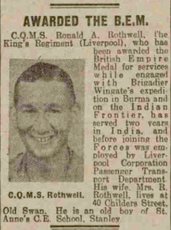 Liverpool Echo 08/02/1944.
Liverpool Echo 08/02/1944.
From the pages of the Liverpool Echo dated 8th February 1944 and under the headline, Awarded the B.E.M:
C.Q.M.S. Ronald Ashley Rothwell, the King's Regiment (Liverpool), who has been awarded the British Empire Medal for services while engaged with Brigadier Wingate's expedition in Burma and on the Indian Frontier, has served two years in India. Before joining the Forces, he was employed by Liverpool Corporation, Passenger Transport Department. His wife, Mrs. Frances Rothwell (nee Collins), lives at 40 Childers Street, Old Swan. Ronald is an old boy of St. Anne's Church of England School in Stanley.
From the pages of the Liverpool Echo dated 11th May 1944 and under the headline, He Managed Mules:
A Liverpool Sergeant has been awarded the B.E.M. for outstanding services in Burma whilst serving with the King's Regiment. He is Sgt. Ronald Ashley Rothwell of Bibby Street, Old Swan. His citation states:
This N.C.O. was for a long period Animal Transport Sergeant, in which capacity he raised the standard of mule management to such a degree that all the animals for which he was responsible reached and crossed the Irrawaddy River, with the exception of a few killed in action. The more credit is due to him in that he had no experience of animals until a short time before the campaign opened, and most of the mules had been out of work until the last moment.
Then appointed Rifle Platoon Sergeant, he brought the same cheerful enthusiasm to bear as before, showing coolness in action and cheerfulness on the march. During the withdrawal (from Burma) he suffered both from fever and a sprained knee, but uttered no word of complaint and brought his men in successfully.
Ronald Rothwell died in the last quarter of 1985; for me his story is just another example of an ordinary Liverpool man, whose efforts and achievements during world war two, proved to be quite extraordinary.
Update 06/12/2017.
From a selection of photographs involving 5 Column and their dispersal in 1943, comes this image of Sgt. Rothwell and another Chindit safely over the Chindwin River and enjoying their first proper cigarette for many weeks.
C.Q.M.S. Ronald Ashley Rothwell, the King's Regiment (Liverpool), who has been awarded the British Empire Medal for services while engaged with Brigadier Wingate's expedition in Burma and on the Indian Frontier, has served two years in India. Before joining the Forces, he was employed by Liverpool Corporation, Passenger Transport Department. His wife, Mrs. Frances Rothwell (nee Collins), lives at 40 Childers Street, Old Swan. Ronald is an old boy of St. Anne's Church of England School in Stanley.
From the pages of the Liverpool Echo dated 11th May 1944 and under the headline, He Managed Mules:
A Liverpool Sergeant has been awarded the B.E.M. for outstanding services in Burma whilst serving with the King's Regiment. He is Sgt. Ronald Ashley Rothwell of Bibby Street, Old Swan. His citation states:
This N.C.O. was for a long period Animal Transport Sergeant, in which capacity he raised the standard of mule management to such a degree that all the animals for which he was responsible reached and crossed the Irrawaddy River, with the exception of a few killed in action. The more credit is due to him in that he had no experience of animals until a short time before the campaign opened, and most of the mules had been out of work until the last moment.
Then appointed Rifle Platoon Sergeant, he brought the same cheerful enthusiasm to bear as before, showing coolness in action and cheerfulness on the march. During the withdrawal (from Burma) he suffered both from fever and a sprained knee, but uttered no word of complaint and brought his men in successfully.
Ronald Rothwell died in the last quarter of 1985; for me his story is just another example of an ordinary Liverpool man, whose efforts and achievements during world war two, proved to be quite extraordinary.
Update 06/12/2017.
From a selection of photographs involving 5 Column and their dispersal in 1943, comes this image of Sgt. Rothwell and another Chindit safely over the Chindwin River and enjoying their first proper cigarette for many weeks.
Copyright © Steve Fogden, April 2017.
